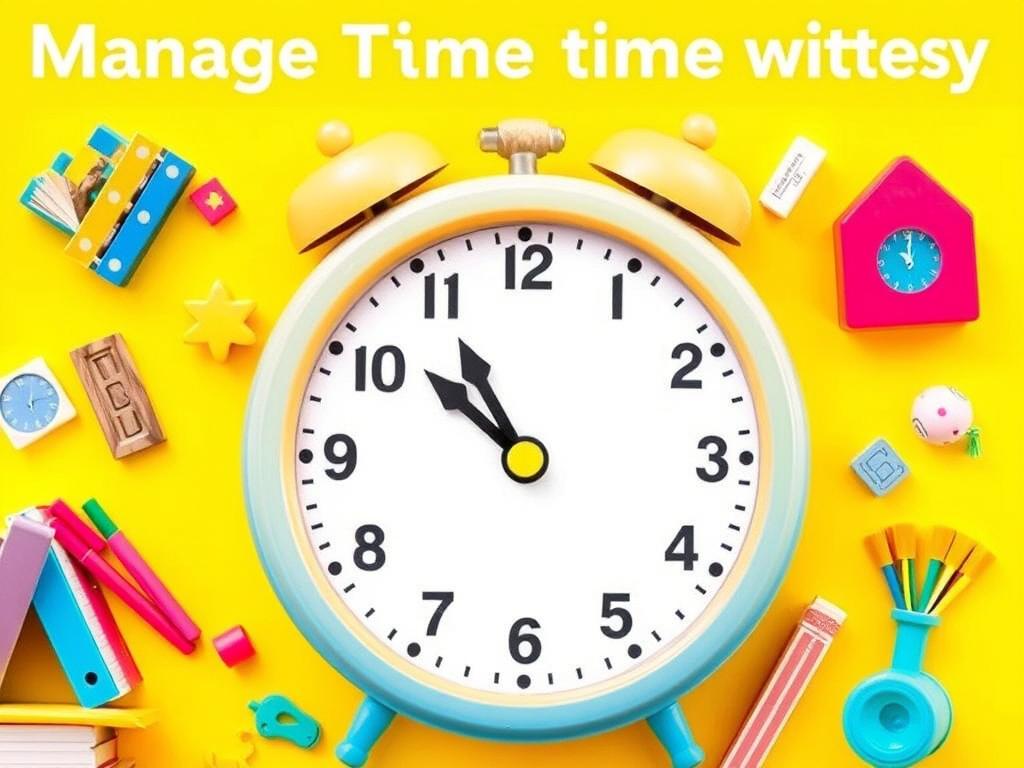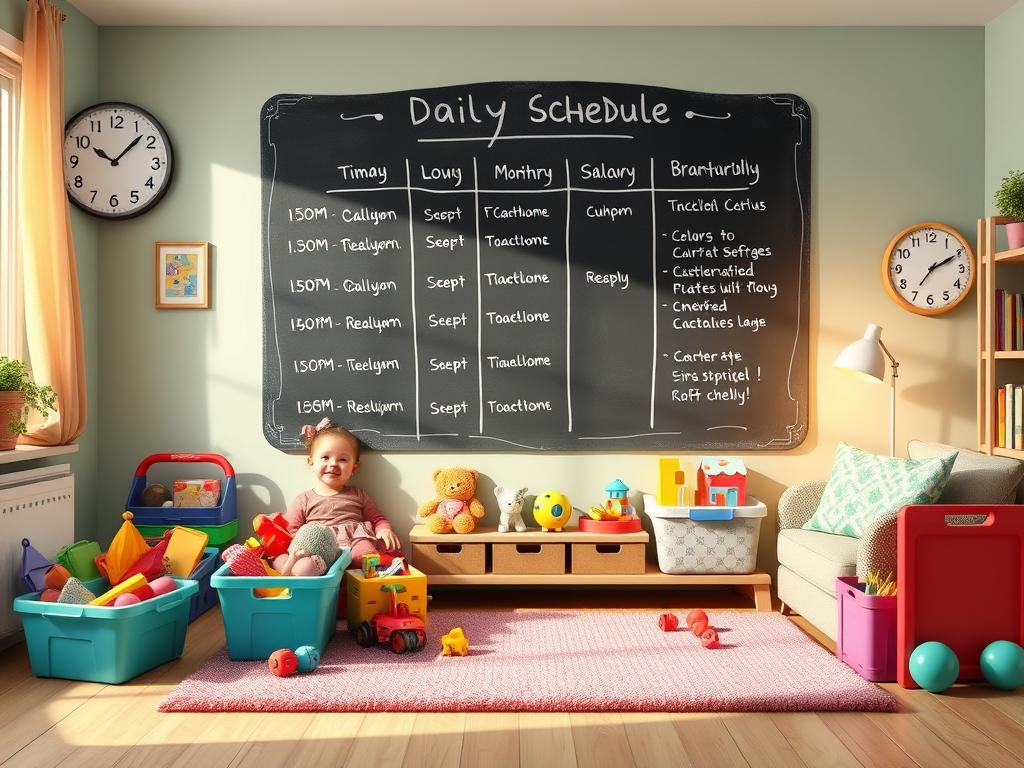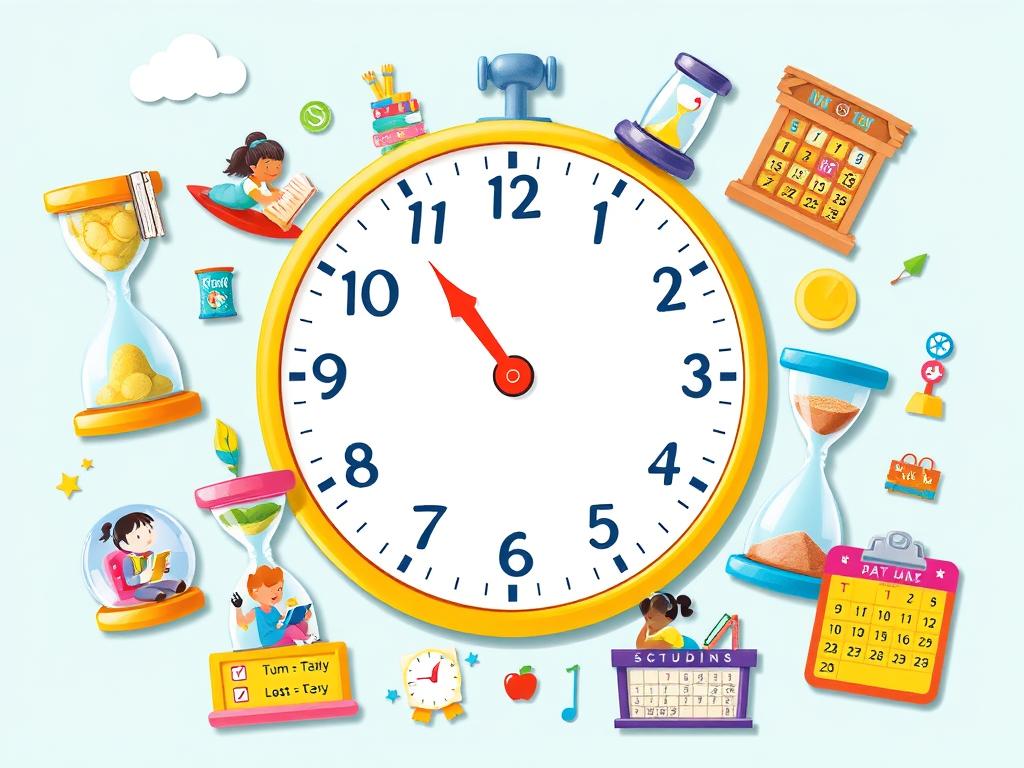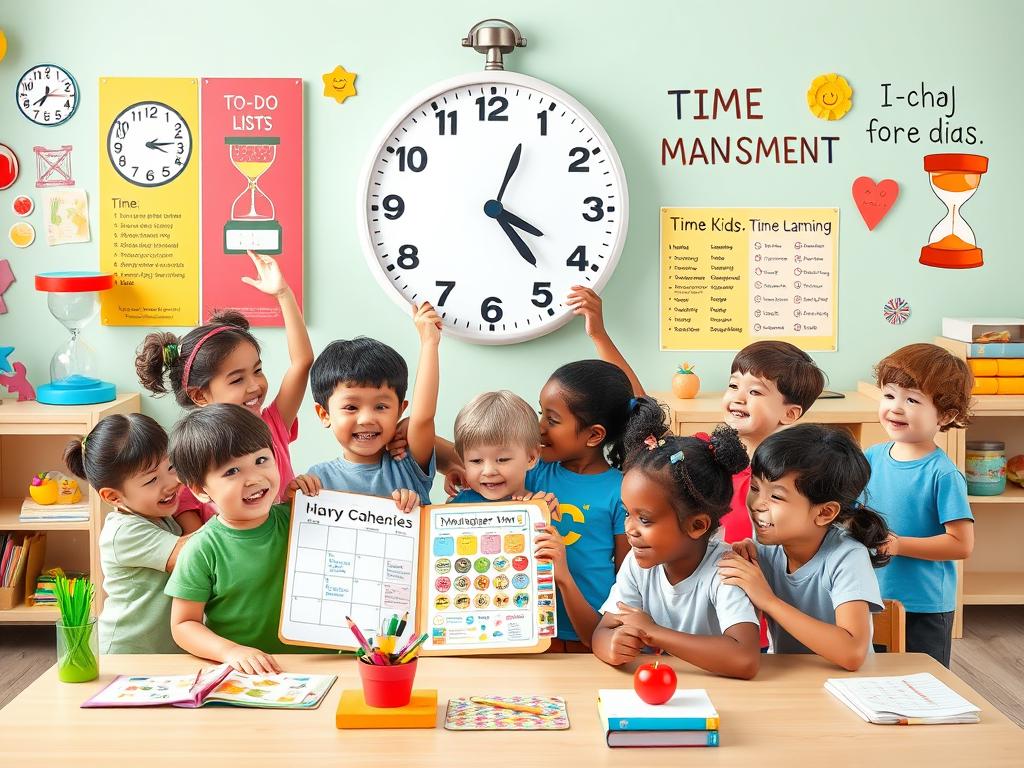As a parent of three young children under the age of four, the challenges of parenting often feel like a high-wire act. Picture this: nap time rolls around from 2 PM to 4 PM, and it’s a race against time. I utilize this precious two-hour window to dive into work tasks that I can’t juggle while keeping an eye on the little ones. It’s in these moments that I’ve discovered the power of effective time management strategies to not just balance work but to carve out significant family moments, as managing children’s time effectively becomes an everyday necessity.
During this balancing act, I’ve learned to prioritize my daily tasks—focusing on five essential and three bonus ones—ensuring that I’m not overwhelmed while still providing my kids with the attention they deserve. In doing so, I also came to appreciate the need for grace buffers in my schedule, allowing extra time for the delightful unpredictabilities that come with parenting. With more than half of working parents grappling with managing family time, these parenting tips will help you instill vital time management skills in your children, setting them on a path toward a more organized and successful future.
Key Takeaways
- Teaching time management for kids helps them become more independent.
- Utilizing lists can simplify managing responsibilities.
- Setting boundaries allows for more quality moments with children.
- Flexibility in routines is essential to adapt to unexpected parenting demands.
- Positive reinforcement fosters better behavior and deeper connections.
The Importance of Time Management for Children
Effective time management is essential for children’s developmental journey, playing a pivotal role in their education and life skills. Understanding time management allows kids to grasp the difference between ‘now’ and ‘later,’ paving the way for important life lessons about priority and responsibility. By introducing children’s schedules early, parents can help foster a sense of accountability, which ultimately leads to independence.
Understanding Time Management
Children thrive when they acquire skills to manage their time effectively. Learning to set priorities empowers them to allocate their time wisely on various tasks. Starting these lessons in early childhood, even with preschoolers, aids in developing thoughtful habits. Utilizing visual tools like whiteboards or weekly calendars can clarify the concept of time and organization. This approach allows children to visualize their schedules and engage in their planning.
Benefits of Time Management Skills
Acquiring time management skills during childhood goes beyond meeting deadlines; it lays a strong foundation for future success. Children who effectively manage their time experience reduced stress and improved academic performances. They develop self-reliance and independence, as they feel less rushed and overwhelmed. Having strong time management abilities, especially when entering high school, can lead to better outcomes in both academic and personal endeavors. Reinforcing these skills at home enhances children’s progress and boosts their self-esteem, contributing significantly to their overall well-being. For more practical insights into integrating exercise and organization into daily routines, check out this resource.

Setting Clear Expectations
Establishing clear expectations is essential for parents seeking to support their children’s growth and development. When children understand their responsibilities, they become more adept at managing tasks. Frequent communicating goals and priorities ensures that children connect with their assignments in a meaningful way. This foundation builds a sense of accountability, which is crucial in their overall success.
Communicating Goals and Priorities
Effective communication plays a key role in fostering an understanding of expectations. Parents should clearly outline what they expect from their children, especially when considering that children might behave a few years younger than their peers. By setting realistic goals, parents can help children with ADHD or other challenges grasp their responsibilities better. Using simple language and repeating important instructions can clarify these expectations.
Involving Kids in Planning
Involving kids in planning not only empowers them but also teaches valuable lessons in balancing their commitments. By discussing schedules and allowing them to take part in prioritizing activities, parents actively engage their children in the process. This involvement fosters self-regulation and critical thinking. Signing a contract together can further reinforce this partnership, making children feel motivated and accountable for their choices. As they participate in discussions about their routines, they learn to navigate their own paths, understanding the implications of their decisions.

By setting boundaries for children, parents can minimize disappointments when their children struggle to meet expectations. This proactive approach enhances the parent-child relationship, mitigating frustration and promoting a positive atmosphere for growth.
Creating a Family Schedule
Establishing a structured routine through creating a family schedule can significantly enhance time management within the home. With about 75% of children involved in extracurricular activities, clear organization becomes essential. Utilizing digital tools for organization, such as Google Calendar or scheduling apps like Schoology, can facilitate this process, enabling families to keep track of both academic and recreational commitments.
Utilizing Digital Tools for Organization
Over 80% of parents actively use scheduling apps to coordinate homework and monitor their children’s progress. These digital tools enhance productivity by integrating reminders and alerts, ensuring tasks are completed efficiently. Implementing target time limits has proven effective, with 65% of timed tasks being accomplished within the designated frame. Such structured approaches ensure that families stay on schedule, even amidst busy weeks.
Balancing Activities and Free Time
Maintaining a healthy balance between activities and downtime is crucial for a child’s mental well-being and development. Incorporating breaks into the schedule can lead to a 70% increase in cognitive skills, emphasizing the importance of not overwhelming children with constant activities. Flexibility remains key, as 90% of families find their schedules modified due to unforeseen circumstances like illness or last-minute events. For families looking to engage in fun outdoor sports together, this balance also allows for spontaneous adventures while supporting quality family time. Explore outdoor options to enrich your family’s summer with engaging activities here.
Teaching Time Awareness
Time awareness is a critical skill for children as they grow. By teaching time awareness, kids can learn how to manage their day effectively, reducing stress and enhancing productivity. Incorporating practical tools such as timers and clocks offers a visual approach to understanding time passing. This method makes the learning process engaging and fun.
Using Timers and Clocks
Using timers and clocks plays a crucial role in developing a child’s sense of time. Various tools like digital planners, kitchen timers, and visual aids can stimulate interest. For example, Emma, a 15-year-old, successfully managed her school assignments through a digital planner on her smartphone. This tool enabled her to track deadlines effectively, leading to an organized workload. Visual reminders and dedicated timekeeping tools can significantly impact time management for children.
Encouraging Time Estimates
Encouraging time estimates helps children develop planning skills. When children guess how long a task will take, they start assessing their commitments in a realistic way. This can lead to improved execution of schedules. Sarah, an 8-year-old, learned to break her homework into smaller, manageable steps, allowing for more time to engage in her favorite activities. Implementing strategies like the Pomodoro technique, where children work for 25 minutes followed by a short break, can reinforce this skill even further.

| Time Management Tool | Example | Benefits |
|---|---|---|
| Digital Planner | Emma’s smartphone app | Better control over assignments |
| Visual Aids | Whiteboard calendar in the Green household | Enhanced visual tracking of activities |
| Study Groups | Lucas and friends meeting weekly | Increased accountability and support |
Implementing these practices within the home can enhance children’s time management skills, fostering a sense of responsibility that prepares them for other life challenges. Parents who strive for patience and guidance during this timeframe contribute significantly to their children’s development. Parents of children with ADHD may find specific tools critical, as it can compensate for the challenges they face in estimating and adhering to time commitments.
For a deeper exploration of essential life skills for children, visit this resource.
Encouraging a Routine
Establishing routines plays a crucial role in promoting effective daily habits for children. Consistent routines create a structured environment that supports smoother transitions between activities and fosters a sense of security. Research indicates that 91% of families experience less chaos and more order when following a routine, allowing children to thrive in a predictable setting.
Establishing Daily Habits
Daily habits can encompass various activities such as homework, chores, and leisure. These routines assist in teaching children valuable time management skills from an early age, with 82% of parents affirming the positive impact of routines on this aspect. Additionally, 67% of families note an increase in children’s independence and self-confidence as they become accustomed to structured activities. Rituals, like family dinners or movie nights, can enhance the emotional bonding within a family, creating positive memories.
Flexibility in Routine
While establishing routines is paramount, introducing flexibility in routines is equally important. Children learn to adapt to changes, managing life’s unpredictability with ease. This adaptability prepares children to handle challenges without experiencing stress. It’s essential for parents to periodically review and adjust their routines based on their children’s evolving needs. As 65% of families report decreased stress and enhanced productivity when following a routine, fostering an adaptable mindset in children proves beneficial.
For more insights into the significance of establishing routines, visit this page.
Monitoring Progress
Effective time management for children requires a proactive approach to monitoring progress. Regular evaluation helps parents identify both the successes and challenges in a child’s learning journey. By focusing on tracking achievements, parents can foster a sense of motivation and encourage continuous improvement. This not only involves standard checkpoints, but also means leveraging real-time monitoring tools that offer a dynamic perspective on their growth.
Tracking Achievements
Implementing structured methods to track achievements can greatly enhance a child’s time management skills. Parents can utilize tools like checklists, grade reviews, and performance evaluations. Regularly revisiting these milestones ensures that children recognize their progress and areas that may need additional attention. Celebrating small wins, regardless of their magnitude, plays a crucial role in building a child’s confidence.
Adjusting Strategies as Needed
Flexibility is paramount when adjusting strategies for time management. Open discussions between parents and children about the effectiveness of current approaches empower young learners. If particular tactics fall short, collaborating with online educators can provide personalized insights. This adaptive process encourages resilience and offers targeted assistance to address specific challenges, which is essential for nurturing effective time management skills.
Providing Positive Reinforcement
Establishing a framework of positive reinforcement is essential for helping children navigate their time management skills. This approach not only boosts confidence but also motivates kids to adhere to their schedules. By recognizing and rewarding achievements promptly, even those that seem minor, parents can create an environment where celebrating successes becomes a norm, reinforcing positive behaviors. This method encourages kids to develop a proactive attitude towards their responsibilities and time management strategies.
Celebrating Successes
Celebrating successes, regardless of their scale, is vital in shaping a child’s motivation. Whether it’s acknowledging the completion of homework on time or successfully managing their after-school activities, rewarding these milestones with praise or small tokens can significantly enhance their enthusiasm. Consistency in providing positive reinforcement will lead to notable behavioral changes, teaching children that their efforts are valued and recognized. Immediate acknowledgment of good behaviors solidifies the connection between their actions and positive outcomes.
Encouraging Independence
An equally important aspect involves encouraging independence in children. Allowing them the opportunity to make choices about their schedules fosters a sense of control and responsibility. This balance between support and freedom nurtures their growth, preparing them to become proficient time managers. Good habits formed during this developmental stage help instill essential life skills that extend beyond childhood, paving the way towards future success.










